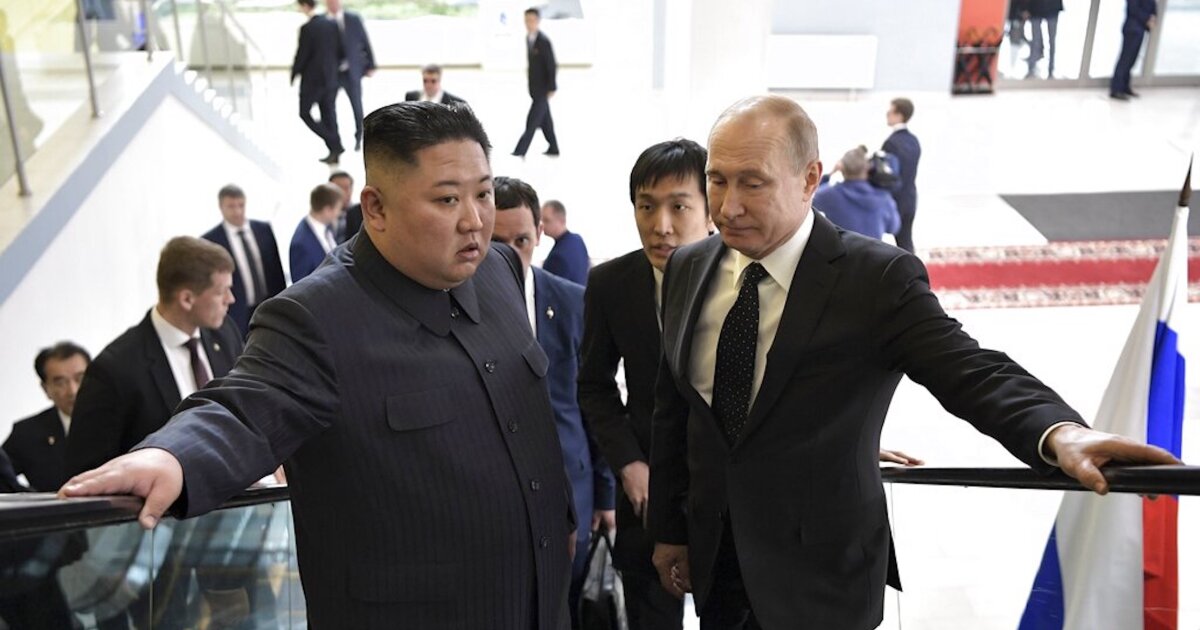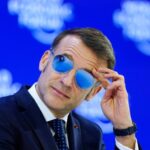

North Korean dictator Kim Jong Un could be the next authoritarian to launch a war of aggression under the cover of nuclear weapons.
Russian President Vladimir Putin’s invasion of Ukraine has inaugurated a new chapter in nuclear weapons deterrence theory, which historically was organized around the principle of mutually assured destruction. The Kremlin chief has invoked Russia’s arsenal of hypersonic and tactical nuclear weapons as a shield to protect the invading Russian forces from a decisive Western intervention, and the efficacy of that tactic could inspire rogue regimes around the world, international officials and analysts fear.
“The Ukrainian war still is a regional war, but the way Russians have waged it, the implications are strategic and global — and for quite a long time to come,” Janis Sarts, the director of NATO’s Strategic Communications Center of Excellence in Riga, Latvia, told the Washington Examiner.
NORTH KOREA’S ‘UNPRECEDENTED’ MISSILE LAUNCH RATE TO RENEW MILITARY STANDOFF
Putin has used the possible employment of tactical nuclear weapons to “cover the flanks” of his military while prominent state TV presenters conduct “constant preparation of the Russian internal public opinion for the nuclear war” — a dramatic contrast to the approach taken by Soviet propagandists during the Cold War, according to Sarts. “The fundamentals of how we treat deterrence are changing because of the aggression [in Ukraine],” he said.
Sarts does not speak for NATO directly, as his organization is accredited by NATO but remains independent of the trans-Atlantic alliance. His team in Riga has monitored the tactics that Russian officials and state media use to limit the aid that U.S. and European governments are willing to provide to Ukraine, however, and the signal their threats broadcast not only to Western capitals but around the world.
“And clearly, North Korea, as well as a number of other nations that want to challenge the West’s dominance are watching closely — not only the nuclear piece but many other pieces,” Sarts, a former senior Latvian defense official, said during a meeting at the Latvian Embassy. “And therefore, in my view, in Ukraine, there is much more at stake than meets the eye, typically.”
Some damage may already have been done if Japanese Prime Minister Fumio Kishida’s “strong sense of urgency that Ukraine today, maybe East Asia tomorrow” is correct. Kishida, addressing an international security conference in Singapore on Friday, aired a series of implicit accusations that China has disregarded various international rules and norms. But his most explicit suggestion, that Putin’s nuclear saber-rattling might inspire imitators, put a spotlight on Pyongyang rather than Beijing.
“The ramifications of Russia’s threat to use nuclear weapons are not limited to the threat itself. The threat may have already caused serious damage to the nuclear nonproliferation regime,” the Japanese leader said. “Even before the Ukraine crisis, North Korea frequently and repeatedly launched ballistic missiles, including ICBM-class missiles, and we have great concerns that yet another nuclear test is imminent. The nontransparent buildup of military capacity, including nuclear arsenals that can be seen in the vicinity of Japan, has become a serious regional security concern.”
North Korea’s nuclear test has been expected for weeks, with little clarity about when exactly Kim might order the demonstration. And North Korea tested a barrage of short-range ballistic missiles following an explanation that the regime was “enhancing the efficiency in the operation of tactical nukes.” That unusual statement is rendered all the more ominous for its publication in the context of Russia’s war in Ukraine, though U.S. officials hesitate to link the two in public.
“I’m always cautious about speculating on what’s influencing the DPRK leadership’s decision-making,” Ambassador Sung Kim, the State Department’s special envoy for North Korean issues, told reporters June 7. “So I don’t know, honestly, whether some of their brazen activities and statements this spring are influenced by developments, external developments, including what’s happening in Ukraine.”
In any case, South Korean officials are speaking of North Korea’s tactical nuclear weapons as a qualitative change to the danger posed by the regime.
“And now, its nuclear missile threats have become more than a simple threat,” South Korean Defense Minister Lee Jong-sup said Sunday at the International Institute for Strategic Studies Shangri-La Dialogue, where the Japanese prime minister also spoke. “From short-range to intercontinental ballistic missiles, North Korea’s repeated missile provocations are advancing in quantity and quality. … Our government will strengthen capabilities to better implement the U.S. extended deterrence and will dramatically enhance response capabilities of the Republic of Korea military to deter North Korea’s nuclear and missile threats.”
Secretary of State Antony Blinken and his South Korean counterpart “expressed special concern over North Korea’s increasingly aggressive rhetoric regarding the use of tactical nuclear weapons” during their meeting Monday, as the South Korean diplomacy chief put it.
“We affirmed that any North Korean provocations, including a nuclear test, will be met with a united and firm response from our alliance and the international community,” South Korean Foreign Minister Park Jin told reporters at the State Department. “We affirmed that any North Korean provocations, including a nuclear test, will be met with a united and firm response from our alliance and the international community.”
North Korea’s tactical nuclear capabilities appear more significant in light of the Kim regime’s historic desire to unify the Korean Peninsula as a communist state. Granted, North Korean officials last year removed the communist party regulations that called for a “revolution for the national liberation of the Korean people,” but even that updated text affirmed that North Korea wants to force the United States to withdraw from the peninsula.
“Does this become a circumstance where North Korea feels emboldened by having these nuclear weapons, [such] that they could then engage in a war or a conflict with South Korea or Japan?” said Foundation for Defense of Democracy senior fellow Anthony Ruggiero. “There’s the other aspect, which is coercion — potentially, the prospect of an actual conflict supported by a nuclear weapons program allows North Korea to be even more aggressive. I think that’s on the mind of the Japanese prime minister.”
The answer to those questions may be linked to the unfolding Russian campaign in Ukraine, where Putin has demonstrated the utility of possessing nuclear weapons in the context of an offensive war, even if they go unused.
CLICK HERE TO READ MORE FROM THE WASHINGTON EXAMINER
“What we’ve seen with Putin is that prevents the global response or limits the global response. You don’t see it play out actually in the operational theater,” continued Sarts of NATO. “It plays on a global scale. … If you see them gaining ground partially by [flouting] all the rules, challenging the West, yet through this nuclear rhetoric and others, actually getting something and not paying a cost, well, what would be [the] lesson?”





